Localization and Robotic Healthcare
Abstract
In this study, a novel scheme is presented. The scheme targets robotic healthcare (RH) node localization. Indeed, sensor devices in robotic healthcare are designed in the form of network clusters, hence mutual interconnections. To collect data from these network clusters, certain mobile robots could be used. In this study’s scheme, the objective is to employ the robot to implement the location estimation process for sensor nodes with which it interacts relative to the radio messages’ signal strengths, having received the signals from the sensor nodes. The implication is that the central purpose of the study lies in the elimination of the static sensor nodes’ processing constraints. Imperative to highlight is that the study’s mathematical contribution lies in the utilization of the REKF-based state estimator to analyze the localization problem. Deviating from Kalman Filter, it is worth noting that REKF exhibits computational efficiency and robustness. Indeed, the localization scheme is implemented on a hybrid network test bed. Findings demonstrate that the proposed design is accurate relative to the node localization process, especially within large indoor settings, as well as 1m.



